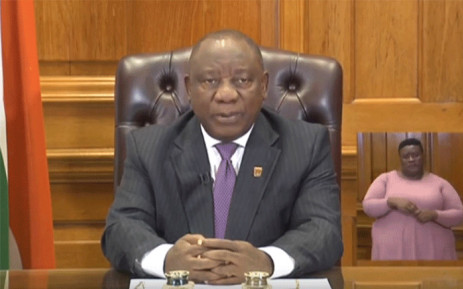SOURCE: EYEWITNESS NEWS (EWN)
President Cyril Ramaphosa has on Tuesday, 21 April 2020, briefed the nation on what government’s plan is to aid and sustain the economy during the COVID-19 lockdown period. Here is a summary of what the president said:
The economy recovery plan consists of three phases.
The first phase began in mid-March when he declared the coronavirus pandemic as a national disaster, which included tax relief, the release of disaster relief funds, emergency procurement, wage support through the UIF and funding to small businesses.
The country is now embarking on phase two of economic response to stabilise economy, mainly looking at decline in supply and demand and protecting jobs. As part of this phase, we are announcing this evening a massive social relief and economic support package of R500 billion, which amounts to around 10% of GDP.
The third phase is the economic strategy we will implement to drive the recovery of our economy as the country emerges from this pandemic. Central to the economic recovery strategy will be the measures we will embark upon to stimulate demand and supply through interventions such as a substantial infrastructure build programme, the speedy implementation of economic reforms, the transformation of our economy and embarking on all other steps that will ignite inclusive economic growth.
Cabinet has considered various proposals and finalised the social relief and economic support package that stands at the centre of the second phase of our economic response. This involves: an extraordinary health budget to respond to coronavirus, the relief of hunger and social distress, support for companies and workers and the phased re-opening of the economy. A total of R500 billion will be directed at fighting the pandemic. Here is a breakdown:
- This will include the reprioritisation of around R130 billion within the current budget. The rest of the funds will be raised from both local sources, such as the Unemployment Insurance Fund, and from global partners and international finance institutions.
- An amount of R20 billion will be directed to addressing our efforts to address the pandemic.
- R50 billion will be directed towards relieving the plight of those who are most desperately affected by the coronavirus. This means that child support grant beneficiaries will receive an extra R300 in May and from June to October they will receive an additional R500 each month. All other grant beneficiaries will receive an extra R250 per month for the next six months. Unemployed who do not receive grant or UIF payment will get R350 for six months. The South African Social Security Agency to implement a technology-based solution to roll out food assistance at scale through vouchers and cash transfers to ensure that help reaches those who need it faster and more efficiently. In addition, to fill the immediate need, the Department of Social Development has partnered with the Solidarity Fund, NGOs and community-based organisations to distribute 250,000 food parcels across the country over the next two weeks.
- An additional R100 billion will be set aside for protection of jobs and to create jobs.
- R40 billion has been set aside for income support payments for workers whose employers are not able to pay their wages.
- An additional amount of R2 billion will be made available to assist SMEs and spaza shop owners and other small businesses.
- The IDC facility to support companies to procure or manufacture personal protective equipment has been utilised in the past few weeks, with finance of R162 million approved to date.
- Other forms of support have been extended to artists, athletes and technical personnel, as well as to waste pickers and public works participants in the environment sector.
- Govt will be introducing a R200 billion loan guarantee scheme in partnership with the major banks, the National Treasury and the South African Reserve Bank. This will assist enterprises with operational costs, such as salaries, rent and the payment of suppliers. In the initial phase, companies with a turnover of less than R300 million a year will be eligible. It is expected that the scheme will support over 700,000 firms and more than 3 million employees through this difficult period. A number of the banks are ready to roll out the product before the end of the month.
- Government is also working on additional support measures for vulnerable and affected sectors like the taxi industry.
- A 4-month tax holiday for companies’ skills development levy contributions will be introduced, fast-tracking VAT refunds and a 3-month delay for filing and first payment of carbon tax.
- Businesses with a turnover of more than R100 million a year can apply directly to SARS on a case-by-case basis for deferrals of their tax payments. No penalties for late payments will be applicable if they can show they have been materially negatively impacted in this period.
- Taxpayers who donate to the Solidarity Fund will be able to claim up to an additional 10% as a deduction from their taxable income.
- In total, these tax measures should provide at least R70 billion in cash flow relief or direct payments to businesses and individuals.

